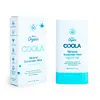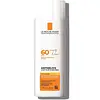What's inside
What's inside
 Key Ingredients
Key Ingredients

 Benefits
Benefits

 Concerns
Concerns

 Ingredients Side-by-side
Ingredients Side-by-side

Zinc Oxide 13.63%
Cosmetic ColorantHelianthus Annuus Seed Oil
EmollientCaprylic/Capric Triglyceride
MaskingCopernicia Cerifera Wax
Ozokerite
Emulsion StabilisingPolymethylsilsesquioxane
Capryloyl Glycerin/Sebacic Acid Copolymer
Skin ConditioningSilica
AbrasiveTrimethoxybenzylidene Pentanedione
AntioxidantButyrospermum Parkii Butter
Skin Conditioning1,2-Hexanediol
Skin ConditioningDimethicone
EmollientEthyl Ferulate
AntioxidantTriethoxycaprylylsilane
Polyhydroxystearic Acid
EmulsifyingLimnanthes Alba Seed Oil
Skin ConditioningMauritia Flexuosa Fruit Oil
Skin ConditioningRubus Idaeus Seed Oil
EmollientOpuntia Ficus-Indica Seed Oil
EmollientZinc Oxide 13.63%, Helianthus Annuus Seed Oil, Caprylic/Capric Triglyceride, Copernicia Cerifera Wax, Ozokerite, Polymethylsilsesquioxane, Capryloyl Glycerin/Sebacic Acid Copolymer, Silica, Trimethoxybenzylidene Pentanedione, Butyrospermum Parkii Butter, 1,2-Hexanediol, Dimethicone, Ethyl Ferulate, Triethoxycaprylylsilane, Polyhydroxystearic Acid, Limnanthes Alba Seed Oil, Mauritia Flexuosa Fruit Oil, Rubus Idaeus Seed Oil, Opuntia Ficus-Indica Seed Oil
Butyl Methoxydibenzoylmethane 3%
UV AbsorberHomosalate 10%
Skin ConditioningEthylhexyl Salicylate 5%
UV AbsorberOctocrylene 7%
UV AbsorberWater
Skin ConditioningCyclopentasiloxane
EmollientAlcohol Denat.
AntimicrobialSilica
AbrasiveDicaprylyl Ether
EmollientStyrene/Acrylates Copolymer
PEG-30 Dipolyhydroxystearate
EmulsifyingDimethicone
EmollientCyclohexasiloxane
EmollientPolymethylsilsesquioxane
Nylon-12
Dicaprylyl Carbonate
EmollientDiethylhexyl Syringylidenemalonate
Skin ProtectingPhenoxyethanol
PreservativeLauryl PEG/PPG-18/18 Methicone
Skin ConditioningSodium Chloride
MaskingCaprylyl Glycol
EmollientPEG-8 Laurate
EmulsifyingIsostearyl Alcohol
EmollientPoly C10-30 Alkyl Acrylate
Emulsion StabilisingDisteardimonium Hectorite
StabilisingP-Anisic Acid
MaskingCaprylic/Capric Triglyceride
MaskingDisodium EDTA
Cassia Alata Leaf Extract
AstringentPropylene Carbonate
SolventSodium Dodecylbenzenesulfonate
CleansingTocopherol
AntioxidantButyl Methoxydibenzoylmethane 3%, Homosalate 10%, Ethylhexyl Salicylate 5%, Octocrylene 7%, Water, Cyclopentasiloxane, Alcohol Denat., Silica, Dicaprylyl Ether, Styrene/Acrylates Copolymer, PEG-30 Dipolyhydroxystearate, Dimethicone, Cyclohexasiloxane, Polymethylsilsesquioxane, Nylon-12, Dicaprylyl Carbonate, Diethylhexyl Syringylidenemalonate, Phenoxyethanol, Lauryl PEG/PPG-18/18 Methicone, Sodium Chloride, Caprylyl Glycol, PEG-8 Laurate, Isostearyl Alcohol, Poly C10-30 Alkyl Acrylate, Disteardimonium Hectorite, P-Anisic Acid, Caprylic/Capric Triglyceride, Disodium EDTA, Cassia Alata Leaf Extract, Propylene Carbonate, Sodium Dodecylbenzenesulfonate, Tocopherol
 Reviews
Reviews

Ingredients Explained
These ingredients are found in both products.
Ingredients higher up in an ingredient list are typically present in a larger amount.
This ingredient is an emollient, solvent, and texture enhancer. It is considered a skin-softener by helping the skin prevent moisture loss.
It helps thicken a product's formula and makes it easier to spread by dissolving clumping compounds.
Caprylic Triglyceride is made by combining glycerin with coconut oil, forming a clear liquid.
While there is an assumption Caprylic Triglyceride can clog pores due to it being derived from coconut oil, there is no research supporting this.
Learn more about Caprylic/Capric TriglycerideDimethicone is a type of synthetic silicone created from natural materials such as quartz.
What it does:
Dimethicone comes in different viscosities:
Depending on the viscosity, dimethicone has different properties.
Ingredients lists don't always show which type is used, so we recommend reaching out to the brand if you have questions about the viscosity.
This ingredient is unlikely to cause irritation because it does not get absorbed into skin. However, people with silicone allergies should be careful about using this ingredient.
Note: Dimethicone may contribute to pilling. This is because it is not oil or water soluble, so pilling may occur when layered with products. When mixed with heavy oils in a formula, the outcome is also quite greasy.
Learn more about DimethiconePolymethylsilsesquioxane is a silicone used as a film forming agent.
When applied to the skin, this ingredient creates an invisible film on the surface. This film still allows oxygen to pass through, but prevents moisture from escaping. This can help condition and hydrate the skin. It also leaves a silky feel when applied.
Polymethylsilsesquioxane has not been shown to clog pores. It has been deemed safe to use up to 55%, but most cosmetics use much less.
If you have concerns about using this ingredient, we recommend speaking with a professional.
Learn more about PolymethylsilsesquioxaneSilica, also known as silicon dioxide, is a naturally occurring mineral. It is used as a fine, spherical, and porous powder in cosmetics.
Though it has exfoliant properties, the function of silica varies depending on the product.
The unique structure of silica enhances the spreadability and adds smoothness, making it a great texture enhancer.
It is also used as an active carrier, emulsifier, and mattifier due to its ability to absorb excess oil.
In some products, tiny microneedles called spicules are made from silica or hydrolyzed sponge. When you rub them in, they lightly polish away dead skin layers and enhance the penetration of active ingredients.
Learn more about Silica